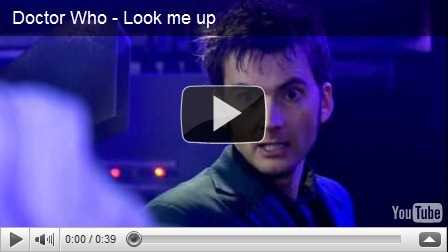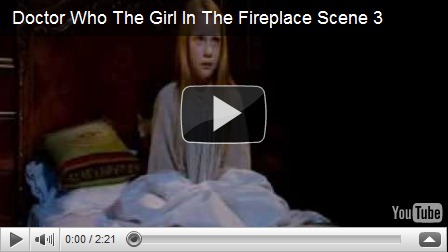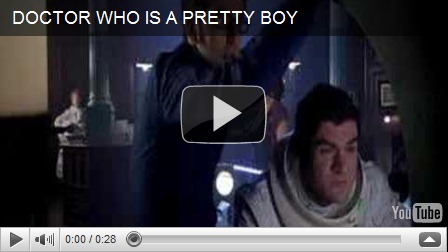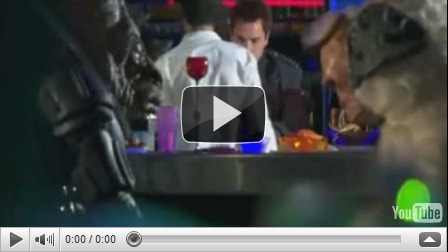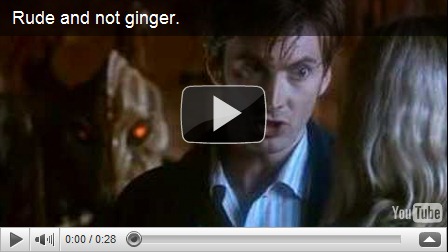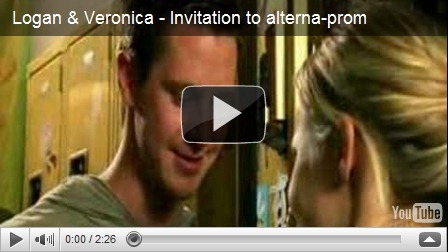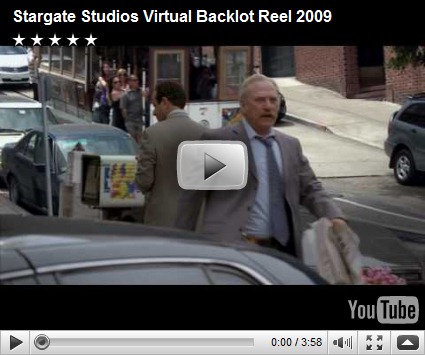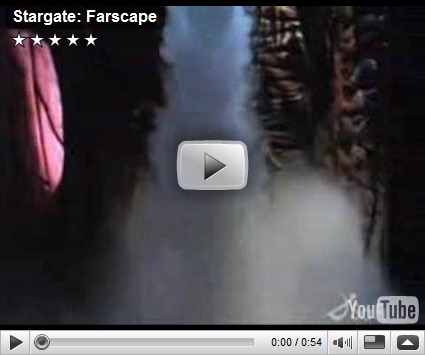I just finished the 2010 season of Doctor Who and I’m quite liking Matt Smith as the Eleventh Doctor. I worried that, after being swept up in David Tennant’s tour de force performance as the Doctor, I wouldn’t. But I do. I like him and I like what he has done with the role.
I think it helps that Smith has had great scripts to work with. In fact on the whole I think he had better scripts to work with as a whole in 2010 than David Tennant did over all his years. DT was saddled with the whole silly Rose story his first season. He inherited Rose as a companion and inherited her relationship with the Doctor. It also seemed as if Russel Davies wasn’t quite sure in what direction he wanted the Tenth Doctor to go. Or, at least, couldn’t let the character go there until Rose was out of the way. There was a lot of silliness in the scripts DT had to work with in his first season but by his second season he was firmly ensconced in what would be the Tenth Doctor’s persona. A combination of wonderful people-person and arrogant all-powerful being.
Smith, on the other hand, entered into a story that seemed to know exactly where it was going from the first episode. He got a brand new companion so there was no need to provide any continuity between the old and the new. But he did inherit River Song, who was one of the best characters from the DT era. I think that helped. And of course Smith got Stephen Moffat as the show runner and chief writer.
I do keep finding myself wondering what DT could have done with the 2010 scripts, since he was so wonderful in the Stephen Moffat stories that were given to him during his tenure. But he’s gone and Smith is here and I’m enjoying Smith’s performances.
The Eleventh Doctor’s chief characteristics seem to be manic energy combined with intense thoughtfulness. Manic intensity? So far he doesn’t seem to have the angst that the Tenth Doctor had. The Tenth Doctor reacted to his difficult regeneration by slipping into a coma-like state; the Eleventh Doctor reacted with ravening hunger. The scene where he has Amelia make him lots and lots of food, none of which he likes, and then settles on fish sticks dipped in custard was funny. It was almost like he was pregnant. And he was – pregnant with a new doctor who wasn’t yet fully formed and out of the womb yet.
I worried that he was too young. The Doctors seem to be getting progressively younger looking while the Doctor himself continues to age. But there is something about the combination of Matt Smith’s eyes and the way that he plays the character that makes him seem older than DT’s Doctor. Whereas DTs Doctor had to come to grips with the danger that he himself posed to the Universe, the Eleventh Doctor seems to simply accept that he is powerful. (In that way he reminds me of the much older Doctors). He almost seems tired of it. The Tenth Doctor had a certain edge to him that made him seem dangerous – culminating in the Time Lord Triumphant scene in The Waters of Mars. The Eleventh Doctor doesn’t seem dangerous at all. He just reminds aliens of the fact that he could be dangerous if he wanted to be. And they believe him.
Compare the two, both of them in episodes scripted by Stephen Moffat in scenes with similar themes – he’s the Doctor and doesn’t need to prove anything. Here is David Tennant’s Ten – “I’m the Doctor, look me up”:
Now compare Matt Smith’s Eleven in his very first episode. Again he reminds the alien that he is the Doctor and makes the alien look at his history. It’s a longer scene because it sets Smith within the history of all the previous Doctors (I particularly like how they run images of the past Doctors and have him walk out of the image of the Tenth Doctor). But his “basically … run” moment is much more calm and controlled than Ten ever was:
Ten was a Doctor in the heroic tradition – always rising to the occasion is a big way. But then beating himself up a bit after. Very Shakespearean, as befits an actor like David Tennant. When Ten tells an alien to watch out because he’s the Doctor, his eyes blaze.
Eleven is a Doctor who looks and sounds like an ordinary guy even when confronting the bad guys, but who really isn’t an ordinary guy. He’s a more tired Doctor. When he says “basically … run” his eyes don’t blaze. You know that he means it, but you also can tell that he’s said it many, many times before. He looks almost tired of having to say it one more time. So in an odd way, Eleven seems older than Ten even though the actor is younger.
At the end of the 2010 Season, the Doctor gets locked in the Pandorica. The Doctor says “Think of the fear that went into making this box”. He says that it was meant to hold a “nameless terrible thing soaked in the blood of a billion galaxies.” Nothing could stop it or halt it or reason with it. He had no idea that it was him.
I think if DT had acted that scene I might very well (MIGHT) have guessed that it was the Doctor it was meant to hold. The Time Lord Triumphant who is beyond reason with no one to restrain him. But that version of the Doctor was redeemed when he sacrificed himself for an old man. And he has been regenerated into a Doctor who has the power to destroy galaxies but really seems to not want to think about those kind of things anymore. He just has to keep saving the universe because that’s what he does. So I could understand Matt Smith’s Doctor’s surprise when he found out that it was him it was meant to hold.
The other thing I like about the 2010 season is the Doctor’s companions, Amy and Rory. I enjoyed Rose during her time with the 9th Doctor. Nine needed someone to bring him out of himself. If Eleven is manic intensity, Nine was manic moroseness. Rose was more sympathetic than Nine in many ways. I remember wondering, though, if the creators of the New Doctor Who didn’t trust that the actor or even the character of the Doctor could carry the show without a strong companion who could take the full focus off the Doctor. I feel a bit the same way about Amy. Having her be such a strong character really worked in this first Smith season. It let Smith ease himself into our imaginations.
But I didn’t enjoy Rose so much the second season. DT could have carried the show from the first moment he appeared on screen; yet the writers couldn’t relegate Rose to a fully subjugated companion position. So they wrote the love story that every Doctor Who fan knew could go nowhere and could only end badly. It wasn’t until the Tenth Doctor got Donna as a companion that they worked out a good modern buddy-relationship between Doctor and companion where the Doctor was the full focus but the companion was a good foil. In fact, the writers went so far as to have the Doctor travel for a time without a companion but gave him story lines that proved he needed a human to restrain him. In a way, it was a way to justify him having companions at all. So the character of the Doctor needs a companion to rein him in even if the actor playing the Doctor can carry the show himself.
Amy seems to be a bit of a combination of both Rose in the first season, keeping the audience’s entire focus off of the new Doctor, and the outspoken Donna. In general, I like her. I didn’t mind that she was the center of the entire first season for Eleven. And I liked that they brought back little Amelia at the end of the season. As I said in a previous post, Stephen Moffat seems to be good at writing scenes for children.
Eleven and Amy have good chemistry but it isn’t sexual (although they do enough to keep us guessing at mid season to keep things interesting). Rory is very likeable so I don’t wish or expect Amy would dump him in the way that Rose dumped Mickey. And it is nice for the Doctor to have a guy around. It happens so seldom.
The story arc for this first Eleven season was written in a way to keep my attention although I’m still not sure I completely understand how the rift in the Universe happened in the first place. I liked the way they used the River character during the season. Alex Kingston does such a great job with that character. Yes, I did find myself wishing for DT during those episodes because the two of them had such great chemistry together on screen. But she and Smith do fine together.
All and all a good season of Doctor Who. We’ll see how I feel after another season. By the end of the Tenth Doctor I had grown very fond of him and was really sad to see him go. So far I like Eleven but I don’t feel the same strong attachment. Not yet. But he has time.
I’m considering downloading the 2011 episodes from iTunes so I don’t have to wait for it.
